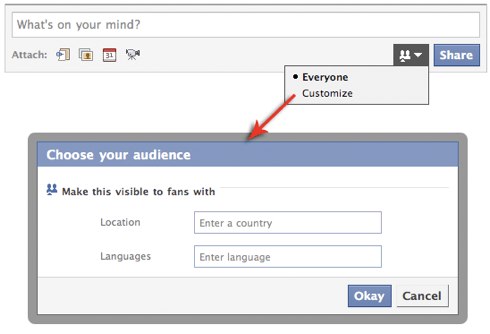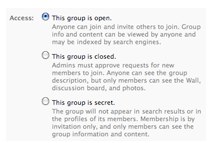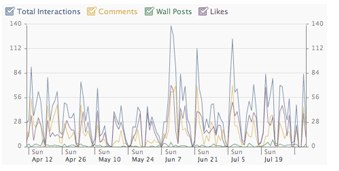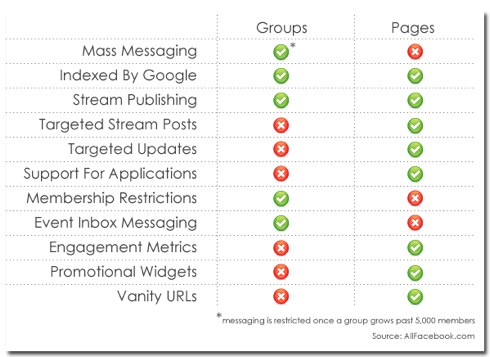It’s no secret that many users have already “moved” to Facebook, where they are already quite successful in promoting their products, services, and just themselves. But not everyone knows how best to begin this path. What is better to create – a group or page of a brand, store, blog, for yourself or for your favorite cat?

© photo
Facebook Group
First, what is a Facebook group? A group is a community in which people can communicate with each other, share information and interact, but only within a given topic or idea.
Groups can be great marketing tools. One of the main functions of the group is to deliver the necessary information on certain topics to the target audience. Some users use the page for the same purpose. But the plus of the group is that you can restrict access to it only for those who received invitations from you, or make limited access to various criteria.
Facebook Page
Unlike groups, pages are publicly available. Basically, they are organized by various organizations or individuals as open sources for all who are somehow interested in the topic of the page (for fans, fans, etc.). If you want to see as many people as possible about your company, then you’d better create a Facebook page.
Facebook Groups and Pages: Compare Features
A small comparative analysis of functions will just suit those who are still not determined in their choice. So what is better – a group or page?
Bulk messaging
One of the most remarkable features of groups is the ability to send messages to all members of this group directly to Facebook users’ inboxes. But there is a limit – no more than 5,000 participants. That is, if your goal is to spread the information among as many people as possible, this function will not be decisive for you.
Indexing by search engines
Both pages and groups are indexed. But administrators can optimize pages for search engines using various applications (for example, Static FBML). This does not mean that the groups are not indexed by Google. You can control the flow of information in groups, and this will be enough for indexing in search engines.
Publication in a shared thread

Another function of groups and pages is the possibility of publication of messages by participants. When people on Facebook update their status (something they write on the wall), their friends will see these updates. Groups and pages have exactly the same function. It is difficult to say who has the advantage in this case more important. But on the pages of the administrators a little more rights, and they can moderate user activity.
Targeting records in streams

It is possible to filter access to records based on the language in which users communicate. That is, if you have English-speaking fans, of course, you would like them to get information only in English. They still can not read Russian. Just as not all of your parents can understand the complex pattern in English. This feature helps to avoid clogging up the news feed and delivering specific content to the end user.
Application Support
One of the biggest differences between groups from pages Is the ability of pages to include applications. Applications are available to administrators who integrate them into the page. For example, with the Static FBML application, administrators can create custom tabs for a page. That is, in this case, applications create for Facebook page administrators a very wide field for activities.
Access Restriction

One of the advantages of groups over pages is the ability to regulate the flow of participants, that is, access to this group. There are three types of groups: open, closed and secret. Open groups work the same way as pages – they can be joined by anyone. Closed group though appears in the search results Facebook, but the administrators decide whether to include you in the group. Secret groups you will not find through the search, access to them can only be obtained if you are sent an invitation.
Events in Inbox
One of the omissions in working with Facebook pages is the inability to send event messages to user mailboxes. Spread this information can only the members of the page, rasshariv its own. And although a fairly large percentage of your users will see the update, the rest will remain unreported. But you can use Facebook ads in order to spread the information among as many users as possible.
In groups, it is possible to send invitations to events to each member of the group. But again the number is limited to 5,000 users.
We include the metric
Facebook pages have a wonderful feature called “Page Insights”. It enables administrators to monitor “demographic” information on their pages – to track which users like certain posts and photos, monitors their activity.

Promotional widgets
If you want to advertise your company’s page (or your personal page) among your customers on Facebook, a special widget will help you. But in groups, unfortunately, there is no such possibility.
Currently, for page administrators, only the widget for fans of the page is available. The rest are under development.
Vanity URLs
And the last feature is Vanity URLs (which is also called “usernames”). This is a unique URLs that redirects the user directly to your Facebook page. There is no such feature in groups, because they are intended for various discussions and information dissemination, and not for raising the brand awareness or public person. The idea is to simplify advertising yourself on Facebook. For example, you can just tell your customers to go to Facebook dot dot oblique “my business” for more information.
Conclusion
And in conclusion a small comparison table Facebook Pages Groups

And do not forget about the page Lifehacker.ru on facebook!
